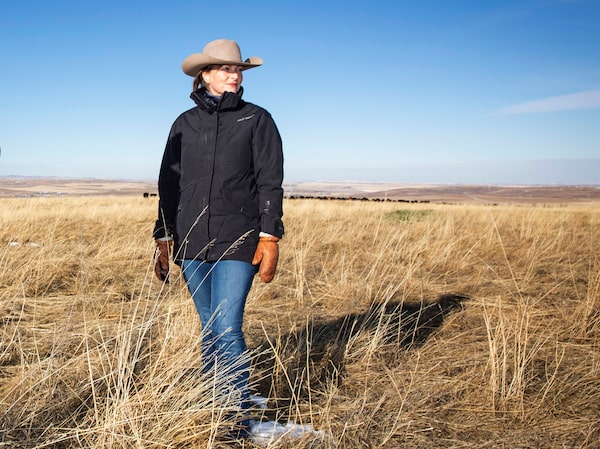
Laura Laing is one of the southern Alberta ranchers who is against the coal mining policy.Todd Korol/The Globe and Mail
The Alberta government has been ordered by a court to hand over a swath of records pertaining to its 2019 decision to quietly nix a policy governing where coal mines can be built in the province.
The case stems back to 2020, when a group of Southern Alberta ranchers requested records around the United Conservative government’s decision to rescind the province’s 1976 Coal Policy without any consultation. The decision caused public backlash so fierce it forced the government to backpedal and introduce new rules around coal mining.
The ranchers had asked for correspondence and briefing materials about the decision, including internal memos, reviews, reports, e-mails and letters. But Alberta Energy dragged its heels and returned few records, many of which were redacted.
Documents previously released to the group confirm the government was talking with the coal industry for years about relaxing a policy that protected the Rocky Mountains from open-pit mines.
The documents, seen by The Canadian Press, also show the province was talking about opening those landscapes to more development generally for at least seven months before letting the public in on its plans.
Last week’s ruling from Alberta’s Court of King’s Bench followed an April, 2023, decision by Amanda Swanek, an adjudicator with the Office of the Information and Privacy Commissioner of Alberta. The province asked for a judicial review of Ms. Swanek’s finding that the government had not properly explained why various records should not be released.
On Friday, almost four years since the ranchers’ initial request, Justice Kent Teskey dismissed the government’s attempt to keep the information secret. The ranchers are now waiting on thousands more pages of records.
The release of records had already been “so slow as to be practically non-existent,” Justice Teskey found, and a judicial review would only exacerbate the delay.
In fact, he said, the government’s very request for a judicial review raised questions of public confidence about the practical reality of the right to information in Alberta.
Dismissing the government’s request, he said that Alberta Energy had denied the ranchers information they were entitled to, and that the court “would not abet this conduct through the availability of judicial review.”
Laura Laing is one of the ranchers at the heart of the claim.
She told The Globe and Mail that while she was pleased with the decision, it has validated her concerns that the government is resisting giving Albertans information to which they’re legally entitled.
“What is in these documents that they are fighting so hard for us not to see?” she said.
Alberta Energy Minister Brian Jean said in an e-mail that the latest decision is under review to determine if the government will file an appeal.
Asked about the case in Question Period on Tuesday, Premier Danielle Smith said her government would “make sure that everyone has the documents required” per the court decision.
Ms. Laing said she hopes that the province doesn’t waste more Alberta taxpayer dollars launching an appeal, and that the court ruling forces the government to be more transparent.
In this case, she said, Albertans have never had any proper answers as to how and why the government made its decision to cancel the 1976 coal policy.
“How can you trust a government that operates in this fashion?” she said.
Ms. Laing acknowledged that after three years of information requests, reviews and court hearings, many people would have given up. But she said finding out why the government decided to nix its coal policy was too important.
“We’re ranchers, we’re gritty. You don’t say ‘whoa’ in the middle of a mud hole,” she said.
In his decision, Justice Teskey criticized the repeated delays by the government.
The government had argued that some of the records in question should be kept secret because they would reveal the deliberations of cabinet (one reason that information can be legally redacted).
While Alberta Energy argued that the general title and topic of a presentation should invoke cabinet confidence, Justice Teskey disagreed.
“Cabinet confidence is essential to ensure that the government can deliberate freely and unimpeded, but it does not exist to allow governing in secrecy,” he wrote.
Justice Teskey also brought up the issue of the government’s failure to identify exactly how many records it even had relating to its decision to cancel the coal policy.
For months, it said there were 6,539 records at the heart of the inquiry. Then, in 2022, the government reduced that to just 2,100 records.
Justice Teskey took the government to task over the change, writing that the number of records in play for a freedom of information request should be precise and uncontroverted – especially 15 months into the process, and especially as the government had argued that the large volume of records meant it needed multiple time extensions.
With a report from The Canadian Press